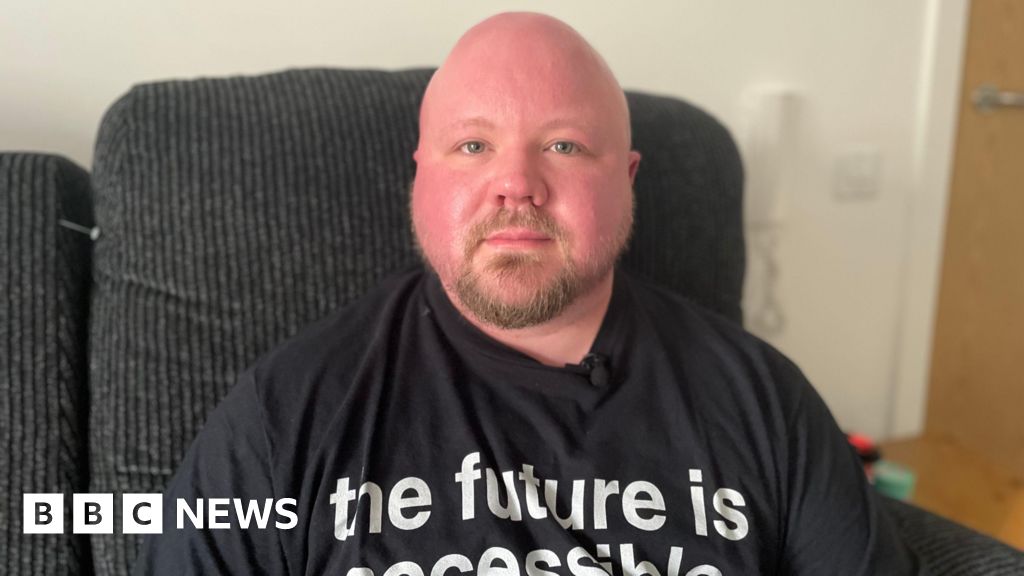A wheelchair user has been unable to independently leave his block of flats for six months after a housing association changed the lock on the door. Lucas Honey said he felt "trapped" in the building in Granton, Edinburgh, due to C-urb installing new magnetic locks which made the front door too heavy to push open. Mr Honey, 36, who underwent surgery in February which further reduced his mobility, said it meant he was only able to leave the block for about an hour a week when a carer was available to assist him. A spokeswoman for C-urb said they would adapt the door to fit Mr Honey's needs as soon as possible. The housing association installed the locks, designed to improve security in the block on Hesperus Crossway following a Police Scotland recommendation, in November last year. The mechanism requires those wishing to leave the building to push a button to release the magnetic lock, then pushing the door to open it. Mr Honey said that was not possible to do without pushing himself out of the chair. He told the housing association, which is part of the Link housing group, in December last year that he was due to undergo surgery. C-urb assured him the adaptations would be made by the time he got out of hospital, which was delayed after he suffered a bout of sepsis and required further surgery. But they have still not been rectified, leaving Mr Honey "physically unable to leave the building" by himself. He said: "They told me it would be fixed by the time I got out of surgery in February. "I'm trapped here. I can't go outside. I can't go to the shop. I can't go for fresh air. I can't go and see my friends. "I'm recovering from two major surgeries and sepsis and I'm trapped in my building and it is having a horrific effect on my mental health and my recovery." Mr Honey had a meeting with C-urb and contractors responsible for the building on 1 April to discuss the installation of a wider door with an automatic opener, but that is yet to happen. He said he is only entitled to 12 hours of care per week under his recovery plan. Mr Honey previously ran a social group for disabled people in Edinburgh, but has been unable to do so since his surgery. He said he was also unable to go out and see friends, pick up prescriptions or go food shopping without eating into his care time. "Obviously, the more I leave the building during that 12 hours, the less care and help I get in the flat," Mr Honey said. "I'm recovering from surgery so it would be nice to go out, but obviously I can't use the whole 12 hours to go out, because I still need care and I still need help round the house. "I just want my life back." C-urb have increased Mr Honey's rent by £57 per month from 1 July. He moved into the building four years ago after it was advertised as a "fully accessible" property, but believes it should have been listed as "ambulant accessible" instead. A spokeswoman for C-urb said Mr Honey's case was a "priority". She said the current issues were "not a long-term solution". The spokeswoman added: "We are fully committed to delivering compliant adaptations as swiftly as possible, including securing the necessary statutory consent. "We are maintaining regular dialogue with the tenant to ensure access issues are managed safely and appropriately in the meantime. "While the current arrangements are not a long-term solution, the tenant is able to leave the building when others are available to open the communal door."
'Lock change has trapped me in my home for six months'
TruthLens AI Suggested Headline:
"Wheelchair User Struggles with Accessibility After Lock Change at Edinburgh Housing"
TruthLens AI Summary
Lucas Honey, a 36-year-old wheelchair user, has faced significant challenges after a housing association changed the locks on his flat in Granton, Edinburgh. The new magnetic locks, installed by C-urb in November, were intended to enhance security based on a recommendation from Police Scotland. However, the mechanism requires users to push a button to release the lock and then push the heavy door open, which is nearly impossible for Mr. Honey, particularly after undergoing surgery that further limited his mobility. He has reported feeling "trapped" in his home for six months, only able to leave for about an hour each week with the help of a carer. Despite assurances from C-urb that adaptations would be made before his surgery in February, no changes have been implemented, exacerbating his sense of isolation and negatively impacting his mental health and recovery process.
Mr. Honey has expressed frustration at the lack of urgency in addressing his situation, which has left him unable to perform daily activities such as shopping, picking up prescriptions, or visiting friends without exhausting his limited care hours. He has previously managed a social group for disabled individuals but has been unable to continue his involvement since his health issues began. C-urb has acknowledged Mr. Honey's case as a priority and stated that they are committed to making the necessary adaptations, including installing a wider door with an automatic opener. Nonetheless, the timeline for these modifications remains unclear, and Mr. Honey continues to feel the detrimental effects of being confined to his home, as he struggles to balance his need for care with the desire for independence and social interaction. His rent has also increased by £57 per month, raising further concerns about the accessibility and suitability of his living conditions, which were initially advertised as fully accessible.
TruthLens AI Analysis
You need to be a member to generate the AI analysis for this article.
Log In to Generate AnalysisNot a member yet? Register for free.
